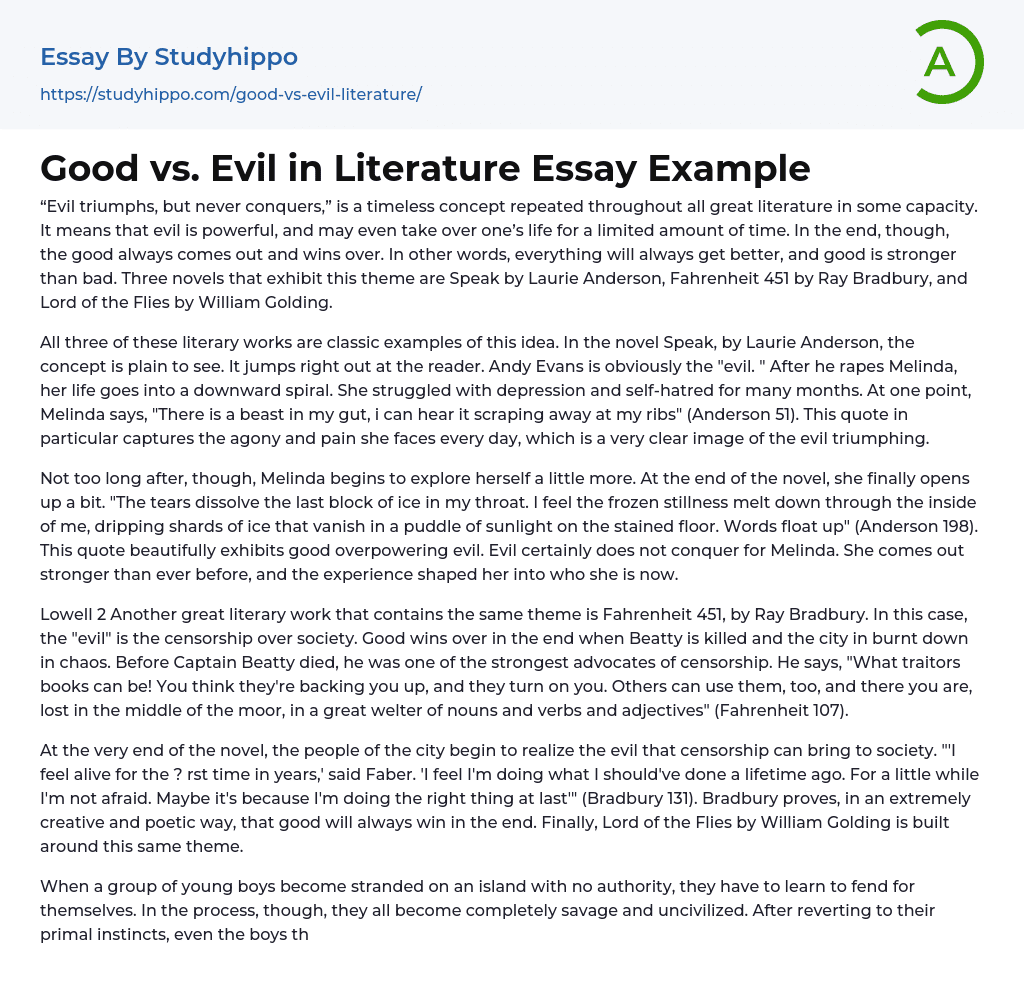“Evil triumphs, but never conquers,” is a timeless concept repeated throughout all great literature in some capacity. It means that evil is powerful, and may even take over one’s life for a limited amount of time. In the end, though, the good always comes out and wins over. In other words, everything will always get better, and good is stronger than bad. Three novels that exhibit this theme are Speak by Laurie Anderson, Fahrenheit 451 by Ray Bradbury, and Lord of the Flies by William Golding.
All three of these literary works are classic examples of this idea. In the novel Speak, by Laurie Anderson, the concept is plain to see. It jumps right out at the reader. Andy Evans is obviously the "evil. " After he rapes Melinda, her life goes into a downward spiral. She
...struggled with depression and self-hatred for many months. At one point, Melinda says, "There is a beast in my gut, i can hear it scraping away at my ribs" (Anderson 51). This quote in particular captures the agony and pain she faces every day, which is a very clear image of the evil triumphing.
Not too long after, though, Melinda begins to explore herself a little more. At the end of the novel, she finally opens up a bit. "The tears dissolve the last block of ice in my throat. I feel the frozen stillness melt down through the inside of me, dripping shards of ice that vanish in a puddle of sunlight on the stained floor. Words float up" (Anderson 198). This quote beautifully exhibits good overpowering evil. Evil certainly does not conquer for Melinda. She comes out stronge
than ever before, and the experience shaped her into who she is now.
Lowell 2 Another great literary work that contains the same theme is Fahrenheit 451, by Ray Bradbury. In this case, the "evil" is the censorship over society. Good wins over in the end when Beatty is killed and the city in burnt down in chaos. Before Captain Beatty died, he was one of the strongest advocates of censorship. He says, "What traitors books can be! You think they're backing you up, and they turn on you. Others can use them, too, and there you are, lost in the middle of the moor, in a great welter of nouns and verbs and adjectives" (Fahrenheit 107).
At the very end of the novel, the people of the city begin to realize the evil that censorship can bring to society. "'I feel alive for the ? rst time in years,' said Faber. 'I feel I'm doing what I should've done a lifetime ago. For a little while I'm not afraid. Maybe it's because I'm doing the right thing at last'" (Bradbury 131). Bradbury proves, in an extremely creative and poetic way, that good will always win in the end. Finally, Lord of the Flies by William Golding is built around this same theme.
When a group of young boys become stranded on an island with no authority, they have to learn to fend for themselves. In the process, though, they all become completely savage and uncivilized. After reverting to their primal instincts, even the boys themselves begin to fear each other and what they have become. “What are we? Humans? Or animals? Or savages? What’s grown-ups going to
think? ” (Golding 79). Once the boys ? nally get rescued, they remember civilization and return to themselves. They regret the awful things they did on the island and realize that they actually are savage. Ralph wept for for the end of innocence, the darkness of man's heart, and the fall through the air of a true, wise friend called Piggy" (Golding 202). The ending to Lord of the Flies is more bittersweet than any of the other literary works, because although the boys snap back into reality and the good comes back, they still have many emotional and mental scars to deal with for the rest of their lives. In conclusion, the idea that "Evil triumphs, but never conquers" rings true throughout all great Lowell 3 literature.
The novels Speak, Fahrenheit 451, and Lord of the Flies all uniquely but effectively display this concept. All three books had different sources of evil and good, but they all ended up proving the statement to be true. The main point is that whether it be in literature or daily life, things will always get better. It has always been that way and it always will be. Works Cited Anderson, Laurie. Speak. New York: Farrar Straus Giroux, 1999. Print. Bradbury, Ray. Fahrenheit 451. New York: Ballentine Books, 1953. Print. Golding, William. Lord of the Fliesl. New York: Penguin, 2006. Print.
- Book Summary essays
- Metaphor essays
- Reader essays
- Rhyme essays
- Literary devices essays
- Villain essays
- Books essays
- Genre essays
- Literary Criticism essays
- Writer essays
- Protagonist essays
- Simile essays
- Poem essays
- Book Report essays
- Book Review essays
- Greek Mythology essays
- Plot essays
- Tragic Hero essays
- Coming of Age essays
- Play essays
- Rhetoric essays
- Rhetorical Question essays
- Translation essays
- Understanding essays
- Reason essays
- Character essays
- Letter essays
- American Literature essays
- Literature Review essays
- Utopia essays
- Poetry Analysis essays
- Dante's Inferno essays
- Between The World and Me essays
- Incidents in The Life of a Slave Girl essays
- Flowers for Algernon essays
- Myth essays
- Everyday Use essays
- Boo Radley essays
- Genesis essays
- Richard iii essays
- Alice in Wonderland essays
- On the road essays
- Ozymandias essays
- The Nightingale essays
- Holden Caulfield essays
- Animal Farm essays
- 1984 essays
- A Hanging essays
- Shooting An Elephant essays
- A Tale Of Two Cities essays




